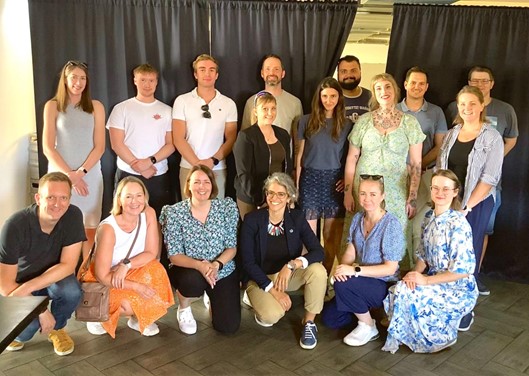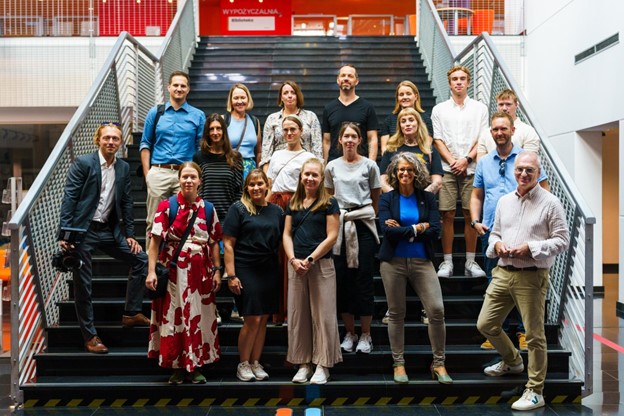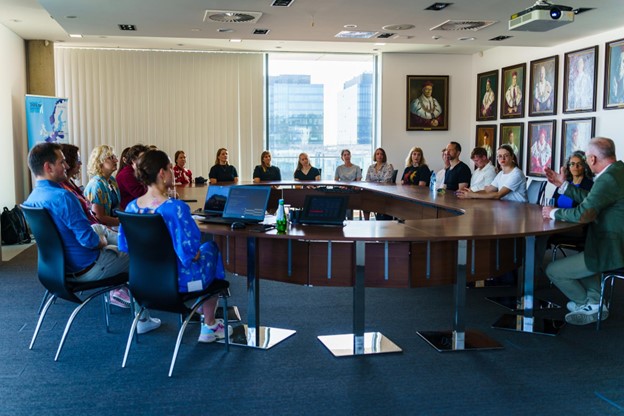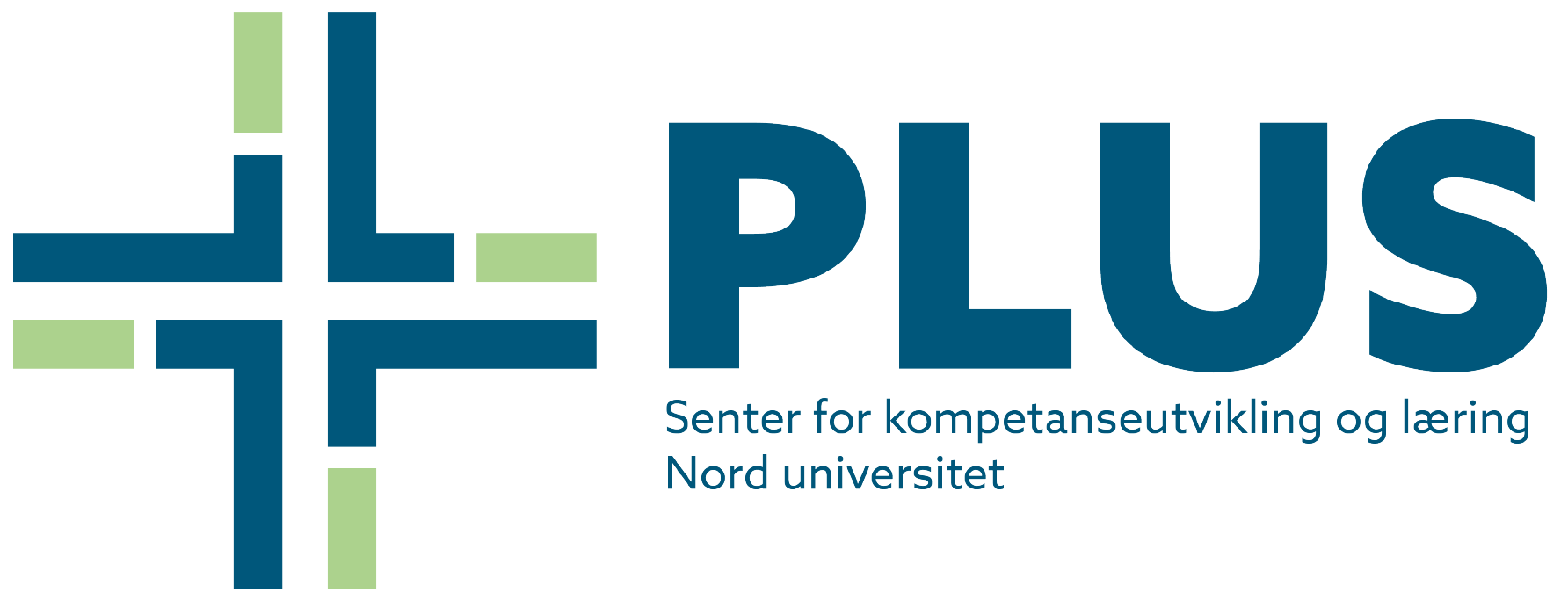By Anna CohenMiller, Tor Eivind Aaneland, and Malin Olsen, September 26, 2024
When we decided to bring master’s students to a 4-day study abroad program, we weren’t sure how it would turn out. Would it be worth our time? For the last year, we have been coordinating, developing and implementing a curriculum for an innovative research program at the University, Nord Master Plus. This is the first year the University has offered this program. The focus is broadly to inspire research and academic thinking for high-achieving first-year master’s students. And so far, we are hearing that students are benefiting from learning from the sessions, presenting, and hearing about each other’s disciplinary research practices, research groups and research projects.

It’s one thing to bring students together on campus to have panel discussions, presentations and hands-on learning. But going abroad together to another academic institution was something new! We knew that research showed the great benefit of study abroad, including short term study abroad (sometimes shortened to STSA). For example, STSA are prime examples of experiential learning, and can lead to increased cultural sensitivity and cultural competence. And we also knew more research needs to be done on the topic, so we lept into this new program for Nord with our eyes open!
As part of the SEA-EU European Alliance, we reached out to partner universities and were immediately invited in by the University of Gdansk. Planning began, and we worked to incorporate sessions to introduce the students to international academics at UG. One challenging aspect, however, was the timing for our September trip. While Norway is well into the semester, Polish universities are still on holiday. But we made it through, and UG found a way to bring graduate students and organizational leaders together to share experiences. And it did take a lot of time to figure the details, to put together the academic curriculum, to manage the timeline, and the logistics of flights and accommodations were challenging to say the least! A fascinating opportunity was also highlighted for students, as they were invited to submit their research to the open-access UG journal, Progress: The Journal of Young Researchers. (The journal has now been submitted for review to be a part of the Norwegian Register for Scientific Journals; so we’ll be keeping our eyes out for the update in the next 6-12 months.)
And students learned. As teachers and researchers leading the trip, it was useful to hear their feedback. Informally, students told us about surprising aspects and about things they loved, and some aspects they wished had been different. Here are a couple snapshots from two graduate students.

Maria Kourkouli, a master’s student studying sustainability and business as part of the research group – Business Index North-Arctic, explained that the trip was an “amazing experience. In more details she reflected back on the trip a few days after and said:
I just returned from an inspiring visit…and I’m filled with excitement about the next step! We had the chance to immerse ourselves in a unique academic and cultural exchange… The trip offered not only insightful discussions on research and PhD pathways but also a deeper understanding of how cross-disciplinary learning can broaden our perspectives.
The highlight for me was presenting our research to an international audience and receiving valuable feedback from others. It was helpful to compare our academic experiences and approaches, especially during the interactive sessions. Beyond the academic setting, exploring Gdańsk’s cultural landmarks with fellow colleagues was also enriching. This experience has inspired me to pursue my research further and keep international collaboration at the heart of my academic journey.
Marthe Skjerpeng Benonisen, a master’s student in the research group Engage: Center for Engaged Education through Entrepreneurship, focuses her work on inclusion and entrepeuneurship. She shared some of the surprising aspects of the trip, such as having the on-campus hotel feel different than expected and being welcomed into the rector’s office. She pointed to particular aspects of both academia and culture:
We had inspiring lectures, got a tour of the headmaster’s office, and got to challenge ourselves with presentations in English. We also got a taste of student life with a visit to the student cafe and authentic Polish food. With newfound confidence in the Polish language, we ordered train tickets and headed into the old town.
We visited the Gdansk Shipyard, a lively area with a food court, bars, cultural monuments and a museum. Gdansk is best summed up as a city with beautiful nature, beautiful buildings and hospitable people. The university was clearly proud to have us visit and our trip was highlighted, filmed and photographed by camera teams from both universities.

So, was the trip work our time as teachers and researchers? Overall, yes and… Yes for the time and effort, incorporating a short term study abroad experience for graduate students seemed to offer incredible opportunities for learning and growth. Students became closer as a cohort and felt valued as part of an international academic community. Those two aspects are immense, and suggest future exploration and research around this topic (which as it turns out, we have submitted a proposal for the Comparative and International Educational Studies conference on this topic ;).
And the and. The program could be improved. We learned that students for the short-term study abroad could benefit even further with a change in the timing of the visit. For instance, we will move the trip to the spring semester, when classes are in session! This change in the program will reduce the work in locating people to bring to the Master Plus sessions and offer more energy and opportunities for sharing experience and learning. Win-win-win.
For others interested in facilitating learning about ourselves and our work in a global world, we highly recommend the idea of incorporating a short-term study abroad program. While we discuss one direction we used as part of the SEA-EU, there are other of exchange, study and staff options, such as through Erasmus programs and short term mobility programs including credit-based (BIP).
For some behind-the-scenes experiences from the STSA to Gdańsk, check out these short videos the students created:
- @Lill Inger Tyvold Berg-Olsen Facebook video link
- @Marthe Skjerpeng Benonisen TikTok video link
And to learn more about mobility at Nord University and some offerings for the community, check out the following links. And if you know of other opportunities, feel free to let us know.
- Research Mobility: https://www.nord.no/en/research/for-researchers/research-mobility
- SEA-EU Mobility & Exchange: https://www.nord.no/en/about/international-collaboration/sea-eu/mobility-and-exchange
- Nord Summer School: https://www.nord.no/en/study-programmes/nord-summer-school
